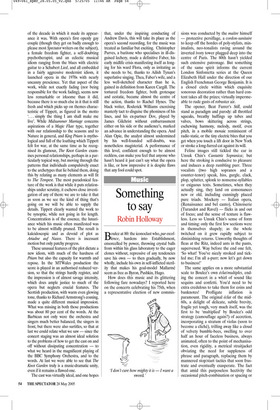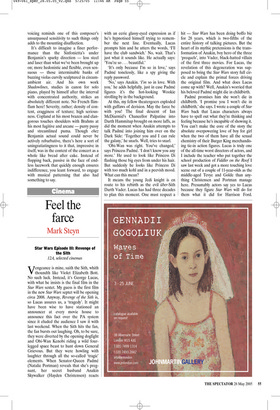Something to say
Robin Holloway
Boulez at 80: the iconoclast who, par excellence, hardens into Establishment, ensorcelled by power, throwing crystal balls from within his glass laboratory to the eager clones without, repressive of any tendencies save his own — to then gradually, by now wholly, include his own in self-inflicted sterility that makes his goal-model Mallarmé seem as free as Byron, Pushkin, Hugo.
How does this music and its glittering following fare nowadays? I reported here on the concerts celebrating his 75th, when a representative election of new commis sions was conducted by the maître himself — protective persiflage, a cordon-sanitaire to keep off the hordes of poly-stylists, minimalists, neo-tonalists raving around the inverted ivory tower plugged deep into the centre of Paris. The 80th hasn’t yielded such extensive patronage. But something of the same spirit informs the current London Sinfonietta series at the Queen Elizabeth Hall under the direction of our English Frenchman George Benjamin. It is a closed circle within which exquisite sonorous decoration rather than hard content takes all the prizes; virtually impermeable to rude gusts of robuster air.
The opener, Beat Furrer’s Still, could stand as paradigm and parody: all throttled squeaks, breathy huffings up tubes and valves, bows skittering across strings, eschewing harmony, melody, motif, even pitch, in a mobile mosaic reminiscent of radio static, or the tiny electric bites that you get when you touch a lift door in New York or stroke a long-furred cat against its will.
Feline images still tickled the ear in Unsuk Chin’s Cantatrix Sopranica; but here the stroking is conducive to pleasure and induces a deep rumbling purr. Three vocalists (two high sopranos and a counter-tenor) speak, hiss, gurgle, clack, plop, splutter, splonk to nonsense-syllables or exiguous texts. Sometimes, when they actually sing, they land on consonances new or old, including cunningly placed pure triads. Mockery — Italian opera, (Renaissance and bel canto), Chinoiserie (Turandot and Ravel) — flicks in and out of focus; and the sense of texture is flawless. Less so Unsuk Chin’s sense of form and timing: only the first few sections were in themselves shapely; as the whole twitched on it grew rapidly subject to diminishing returns. Unworthy thoughts of fleas at the Ritz, indeed ants in the pants, supervened. Way before the end one felt, ‘So what! You’ve nicely stroked and tickled me; I’m all a-purr; now let’s get down to business!’ The same applies on a more substantial scale to Boulez’s own éclat/multiples, ending the concert in a whirl of sound like sequins and confetti. You’d need to be extra credulous to take them for coins and banknotes! Profligate inflation is paramount. The original éclat of the mid60s, a delight of delicate, subtle brevity, fragile yet tough, very much itself, was the first to be ‘multiplied’ by Boulez’s odd strategy (camouflage again?) of accretion, incorporating a stratum of violas (soon to become a cliché), trilling away like a cloud of velvety bumble-bees, swelling to over half an hour of faceless business, always animated, often to the point of mechanisation, even rigidity, a metrical straitjacket obviating the need for suppleness of phrase and paragraph, replacing them by mannered stop/start tactics that soon frustrate and eventually exasperate. The fact that amid this purposeless hectivity the occasional pitch-combination or spacing or voicing reminds one of this composer’s unsurpassed sensitivity to such things only adds to the mounting disaffection.
It’s difficult to imagine a finer performance than the Sinfonietta’s under Benjamin’s sparky direction — less steel and laser than what we’ve been brought up on; more hedonistic and flexible, even sensuous — those interminable banks of buzzing violas curvily sculptured in circumambient air. And his own work Shadowlines, studies in canon for solo piano, played by himself after the interval with concentrated authority, strikes an absolutely different note. No French flimflam here! Severity, rather; density of content, cragginess of texture; high seriousness. Copland at his most brazen and clangorous touches shoulders with Brahms at his most fugitive and arcane — purry pussy and streamlined puma. Though chez Benjamin actual sound could never be actively rebarbative, there’s here a sort of uningratiatingness to it that, impressive in itself, was in the context of the concert as a whole like bread after cake. Instead of flopping back, passive in the face of endless lacework that quickly enough ensures indifference, you leant forward, to engage with musical patterning that also had something to say.























































 Previous page
Previous page